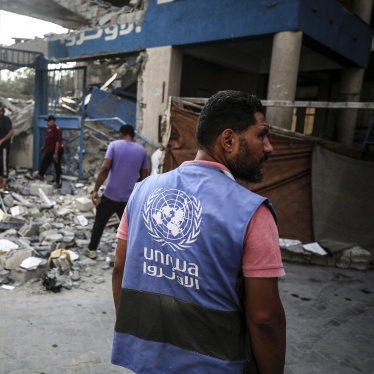Qatar should arrest and prosecute Izzat Ibrahim al-Duri, a visiting senior Iraqi official suspected of responsibility for crimes of genocide, mass murder and torture, Human Rights Watch urged today.
Izzat Ibrahim al-Duri, vice-chairman of Iraq's ruling Revolutionary Command Council (RCC) and deputy commander-in-chief of Iraq’s armed forces during Iraq's 1988 campaign of genocide against the country’s Kurdish population, is attending an emergency summit meeting of the Organization of the Islamic Conference in Qatar’s capital, Doha. “As Saddam Hussein's number two, Izzat Ibrahim has been involved in some of Iraq's worst crimes – including the use of poison gas against the country’s Kurds," said Kenneth Roth, executive director of Human Rights Watch. "Qatar should take this opportunity to bring him to justice and the international community should back his prosecution."
In a letter to Hasan bin Abdallah al-Ghanim, Qatar’s Minister of Justice, Human Rights Watch noted that Izzat Ibrahim al-Duri has served as Deputy Chair of the Revolutionary Command Council (RCC)—effectively number two in the government—since Saddam Hussein took full power in 1979. In 1988, he was also a member of the RCC's Northern Affairs Committee that, along with the Ba'th Party's Northern Bureau Command, was the administrative backbone for the genocidal Anfal campaign against Iraq's Kurdish population. The Northern Affairs Committee placed its seal on a June 20, 1987 directive, coded SF/4008, which called for "special strikes”—i.e., chemical attacks—“to kill the largest number of persons" in designated zones, as well as the capture and execution of all adults found in prohibited areas. Ibrahim was reported in the Washington Post on January 24, 1991, as warning the people of Sulaimaniyya, a major city in the Kurdish north, "if you have forgotten Halabja, I would like to remind you that we are ready to repeat the operation." The Kurdish city of Halabja was the target of a major Iraqi chemical weapons assault on March 16, 1988 that killed as many as 5,000 residents.
The crimes that Izzat Ibrahim is credibly alleged to have committed, including systematic or widespread killings, “disappearances,” and torture, constitute crimes against humanity. As such, they are subject to universal jurisdiction, a principle well established in international law. Under this principle, Qatar, like all states, is entitled to arrest, prosecute, and punish persons implicated in crimes against humanity, irrespective of where or when those crimes took place.








